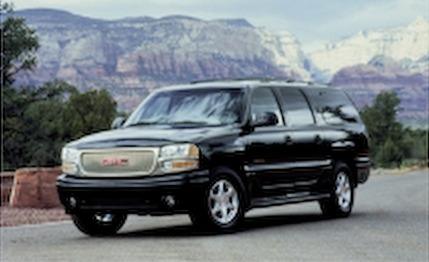
 First Drive Review
First Drive Review
Meet the new GMC Yukon Denali. Minimum curb weight, according to the manufacturer: 5450 pounds.
And meet the new Yukon XL Denali. Minimum curb weight: 5850 pounds.
Now, get this: GMC fearlessly uses the word "agility" in describing these mastodons. "Unsurpassed agility," to be precise. And you know what? GMC has a case.
These Sunday-go-to-meetin' versions of GMC's enormous SUVs aren't the right rides for an autocross. But they're not lifeboats in a gale, either. If your notion of agile has an upper size limit somewhere in the dimensional realm of, say, a Chevy Corvette, you're probably having trouble with this concept, just as we did -- before we spent a half-day charging around on some sinuous and lumpy roads in Southern California. At the end of that day, we began to modify -- expand is probably a better word -- our agility horizons. Consider rhinoceroses, for example. Massive, yes. But for all their bulk, these warlike quadrupeds are fast enough to mix it up with unwary Land Rovers and are shifty enough to change directions like Jerome Bettis shredding opposing secondaries. And so it is with this Denali duo. Big, yes. Tanglefooted brutes, no.
A word on origins. As its name suggests, the Yukon Denali is closely related to the GMC Yukon, which is in turn all but identical with the Chevy Tahoe. GM's answer to Ford's big Expedition, the Tahoe and the Yukon were renewed last year, moving to a sport-utilitized version of the new GMT800 full-size truck platform. The Yukon Denali, which was to have been GM's high-end full-size SUV offering before it was upstaged by the Cadillac Escalade, rolled into 2000 still using the old chassis and the old 5.7-liter V-8, a delay attributable to corporate resource priorities. For '01, it rides the new chassis, has three rows of seats, and is essentially an all-new truck.
The same can't really be said for the Yukon XL Denali, an upgraded edition of the Yukon XL, launched last fall. For decades this vehicle was called the Suburban by both Chevy and GMC, but with the advent of the GMT800 version, GMC decided to create a new name, part of the division's effort to become something other than a collection of Chevrolet clones. XL was the best the marketing guys could come up with, but if you think of it as Xtra Large, as we do, it works well enough.
As big as they are, GM's mega-utes aren't the biggest. The Tahoe/Yukon/ Yukon Denali is a smidge smaller than the Ford Expedition and the Lincoln Navigator, and the Suburban/Yukon XL/Yukon XL Denali is a little smaller than the Ford Excursion. This doesn't really diminish the capabilities of the General's oxen. The Denali twins -- make that brothers -- can't swallow quite as much cargo as their Ford counterparts, but they're more powerful -- with 320 horsepower and 365 pound-feet of torque from GM's new 6.0-liter Vortec V-8 -- and they can haul trailers weighing up to 8500 pounds (8400 for the XL). They also seem to be more respectable in the 0-to-60 department -- 8.7 seconds for the Denali, 9.2 for its bigger brother, according to GMC. And avoiding biggest-of-breed ranking helps out in the realm of political correctness. Remember all the eco-commando heat Ford had to handle when the Excursion was unveiled? Biggest has become bad juju, mate.